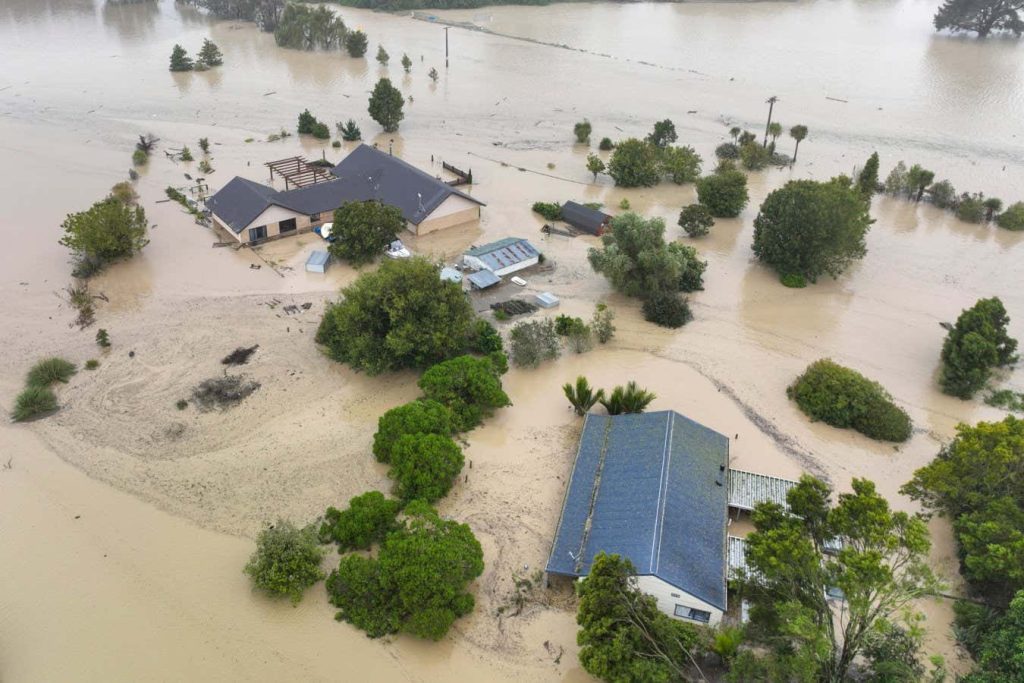Flooding caused by Cyclone Gabrielle in Awatoto, near the city of Napier. – New Zealand
STR/AFP/Getty Images
A COUPLE of weeks ago I visited an experiment in a forest in the south of England that is attempting to make young trees old before their time. While I was there, I saw the aftermath of events of a year ago, when the UK was battered by three consecutive named Atlantic storms in just a few days. One of the casualties of that triple whammy was a large beech tree in the forest, felled by a branch that was ripped off its neighbour.
The arrival of three violent storms in less than a week is called a compound disaster – extreme events occurring either together or quickly one after the other, before recovery from the previous one (or ones) can play out. It was also a cascading disaster, where one extreme event triggers others. Storm Eunice, which made landfall in the UK on 18 February 2022 – a day after Storm Dudley – brought lengthy power cuts to more than a million homes, closed schools and businesses and disrupted the UK’s transport system for days. When Storm Franklin arrived three days later, it hampered the clean-up operation from Eunice and led to significant flooding.
All over the world, compound and cascading disasters are becoming increasingly common as the climate warms. For the past two years, eastern Australia has been battling a succession of devastating floods that came hot on the heels of record drought, heat and wildfire conditions in 2019 and 2020. In New Zealand, the destruction wrought by Cyclone Gabrielle last month was compounded by further heavy rainfall a few days later. In 2021, parts of Louisiana in the US were hit by two hurricanes, Ida and Nicholas, in the space of just over two weeks. The list goes on.
Advertisement
Compound and cascading disasters aren’t new, of course. In 1954, before climate change had truly kicked in, the north-eastern seaboard of the US was hit by two hurricanes, Carol and Edna, in the space of 12 days, killing 80 people and causing flooding and damage estimated at half a billion dollars. However, they are getting more frequent.
There is a school of thought that says compound and cascading disasters are precipitating a mental health crisis
Such disasters “are the new normal”, said Susan Cutter at the University of South Carolina in her keynote address to a recent US National Academies of Science (NAS) meeting on the topic. The report that followed described the “new normal” in stark terms, stating that “most disasters do not occur as isolated events and instead seem to pile on one another, disaster after disaster, often unleashing new devastation on a community before it has had a chance to recover”.
Not all are climate-related. The recent examples all happened against the backdrop of another disaster, the covid-19 pandemic. Some involve natural hazards meeting vulnerable infrastructure, like the 2011 Tōhoku earthquake and tsunami in Japan, which flooded the Fukushima nuclear plant, sparking a meltdown there.
We can expect more. A recent paper reported that back-to-back hurricanes – hitting within 15 days in the same place – are getting more common on the east coast and Gulf coast of the US. What used to be a once-a-century event will happen once every two years or so by the end of this century.
Another future risk is a type of event called a “tropical cyclone-deadly heat compound hazard”, where a cyclone or hurricane knocks out the power supply and is quickly followed by a heatwave. Air conditioning units don’t work and millions are exposed to potentially fatal heat in excess of 40°C (104°F). Such events have previously been “vanishingly rare”, according to Tom Matthews at King’s College London. Only four were recorded between 1979 and 2017, all in sparsely populated north-west Australia. But climate models suggest they will become much more common, with as many as one every three years under 2°C of warming, putting millions of people at risk.
To me, this smacks of a tipping point, an irreversible shift in Earth’s natural systems caused by climate breakdown. If so, it is arguably the first that we have crossed, though many others are close. It is a hugely impactful one, too. Disasters, by definition, affect people; compound and cascading ones have a larger impact than any one of their elements alone. There is even an emerging school of thought that says compound and cascading disasters are precipitating a mental health crisis as people experience these events with little or no time for recovery.
What, if anything, can we do? Short of holding warming to current levels – which isn’t going to happen – not a lot. The NAS says there are two options: make disaster-response systems work harder and faster or redesign them completely to deal with such events, though it didn’t say how this might be achieved. But we don’t have much time to waste. According to the NAS, the new norm is an “untenable situation”. The storm clouds have gathered.
Graham’s week
What I’m reading
I’m still ploughing through grief lit. The latest on the pile is The State of Disbelief by Juliet Rosenfeld.
What I’m watching
The new season of ITV’s cold case drama Unforgotten.
What I’m working on
Some grief lit of my own.
Topics:

